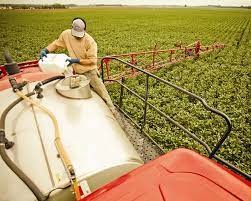Using Adjuvants in Your Pesticide Program
Katelyn Miller, Field Crops and Forage Specialist
Southwest New York Dairy, Livestock and Field Crops Program

An adjuvant is a substance added to a pesticide or spray mixture with a specific function. Different functions include improving mixing, application, and pesticide performance. Formulations can be customized for specific needs and local conditions, making it important to understand their characteristics. As planting season approaches, it's a great time to review how adjuvants can improve pesticide efficacy. Let's start by reviewing the various types of adjuvants you can use in a pesticide mix.
Surfactants help spread pesticide spray droplets evenly. They are also referred to as wetting agents or spreaders because they create a wet leaf surface by decreasing water surface tension. Be careful not to use too much surfactant, as it can cause excessive runoff and reduce pest control.
Stickers increase the adhesion of solid particles to a target surface. They can help reduce evaporation and the amount of pesticide that washes off during rain. Many adjuvants are formulated as spreader-stickers which help spread the pesticide over the leaf surface and adhere to it.
Extenders keep pesticides on the target surface which slows down evaporation and prevents the sun from breaking it down.
Plant Penetrants enhances the penetration of some pesticides into plants.
Compatibility Agents are commonly used to help products mix. They help to reduce clumping, fix uneven distribution, and help to reduce the plugging up of the pump.
Buffers and Acidifiers acidify and stabilize the water in the spray tank. Most pesticide mixes are stable between a pH of 5.5 to 7.0, so the goal is to keep it within this target for the best efficacy.
Drift Control Additives improve placement target by increasing average droplet size.
Thickeners slow the evaporation of pesticides by increasing the thickness (viscosity) of the mix.
Defoaming Agents work to reduce foam created by some pesticide formulation agitation.
Foaming Agents can be added to a spray mix to do the opposite of defoaming agents. Certain formulations work better with foam as it can help reduce spray drift. Usually, foaming agents are used in difficult to reach areas like septic pipes, under stoops, or for termite control.
Now that we've reviewed the types of adjuvants, it's time to take into account some important considerations for selecting one. Keep in mind some of the considerations below with the goals of your farm's pesticide program.
- A single adjuvant can't do everything. Compatible adjuvants can often can be combined to perform multiple functions at the same time.
- Know when and when not to use an adjuvant. Some formulations already use an adjuvant, so double check before adding one to the mix.
- ALWAYS read the label. The "Directions for Use" section will provide mixing instructions, and if any adjuvants are recommended.
- Look for recommendations, suggestions or implied use like the examples shown below.
- Make sure your adjuvant of choice has been thoroughly tested and marked for pesticide use. If you are unsure of its efficacy, test the product on a small area first.
- "spray coverage should be uniform and complete"
- "thorough spray coverage is important"
- "spray mix combinations must be compatible"
- "coverage should be maximized"
There are many options for using adjuvants, so always read the label for instructions and learn which ones can help suite your current pesticide program. If you want more information on adjuvants, refer to the DEC CORE Book, which you can purchase here https://www.cornellstore.com/books/cornell-cooperative-ext-pmep-manuals?page=1. You can also visit https://extension.psu.edu/spray-adjuvants.
Upcoming Events
Piglet Health 101
February 13, 2026 : Piglet Health 101 - Batavia, NY
Batavia, NY
This free workshop from the New York Pork Producers offers hands-on training in essential piglet care and processing practices, led by industry veterinarians from Passion for Pigs. No matter your experience level, this training offers takeaways for both new and experienced producers.
Boots in the Barn: Cornell Dairy Research Updates
January 13, 2026
January 20, 2026
January 27, 2026
February 3, 2026
February 10, 2026
February 17, 2026
February 24, 2026
Join us for some or all!
2026 No-Till & Cover Crop Conference
February 19, 2026 : 2026 No-Till & Cover Crop Conference
South Burlington, VT
Announcements
Cows, Crops & Critters Newsletter Sponsorship
TRYING TO REACH GROWERS AND AGRIBUSINESSES IN OUR SOUTHWEST REGION OF NEW YORK?Weekly Email Update: Shared with 625+ households who have signed up with our program.
Monthly Paper Mailer: To reach our stakeholders and farmers who lack internet access, we send out a monthly mailer where your company's logo and contact information would be featured with a mailing list of 330+ households.
If you sponsor our weekly and monthly publications you reach approximately 955 households.





